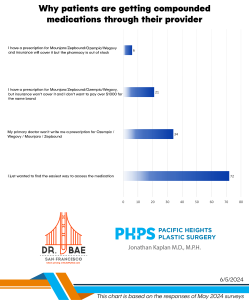Consumers reluctant to try new weight loss drugs seem to focus more on the least likely risks such as pancreatitis and a rare type of thyroid cancer rather than focusing on the more common side effects like burping, nausea, vomiting, constipation and diarrhea. Instead of focusing on the risks associated with taking the medication, patients should focus on one of the more life-threatening risks associated with obesity and not taking the medication: cancer.
That’s right. Behind smoking and excessive exposure to ultraviolet light from the sun or tanning beds, obesity is the third most common risk factor for thirteen different types of preventable cancer, including endometrial (uterine) cancer, breast cancer in postmenopausal women, and colorectal cancer. Considering that 42% of US adults have obesity, this is a major emotional and financial cost to the health of society and the economy.
Based on evidence from the Cleveland Clinic, weight loss by any means, not necessarily from weight loss surgery, led to a reduction in cancer incidence. And with greater weight loss, there was an even greater reduction in the risk of cancer.
Despite the benefits of cancer reduction and avoiding other obesity-related diseases, consumers who fit the Body Mass Index (BMI) parameters are hesitant to start these medications. They may be falling prey to erroneously emphasized risks and other misconceptions surrounding GLP-1 receptor agonists.
GLP-1 Receptor Agonists
Ozempic and Wegovy, the popular weight management drugs making the rounds on social media are part of a class of medications called incretin mimetics. They mimic the effects of the naturally occurring glucagon like peptide (GLP-1) gastrointestinal hormone that increases after eating, leading to a release of insulin from the pancreas to drive sugars from the blood into tissues for use as energy. That release of insulin also creates a feeling of satiety or fullness.
Ozempic, approved for use in type 2 diabetes in 2017, was found to also lead to weight loss in patients taking the medication. And since 86% of patients with type 2 diabetes are also obese, this suggests that treating obesity will also treat other obesity-related diseases such as high blood pressure, diabetes, sleep apnea and non-hereditary high cholesterol.
NovoNordisk, the makers of Ozempic recognized this pattern of weight loss in their FDA approval studies for Ozempic. So they gained FDA approval specifically for obesity under the brand name Wegovy in 2021. The active ingredient in both Ozempic and Wegovy is semaglutide. The only difference in the two drugs is that Wegovy is approved for a higher 2.4 mg once-per-week injection versus Ozempic’s maximum 2 mg weekly injection.
Safety Profile of Ozempic and Wegovy
One reason these medications have received so much fanfare, aside from the average 15.1% weight loss (~35 pounds) after 68 weeks of treatment, is the relative safety of the medications compared to previous weight loss medication. For example, in the 1990’s the weight loss combination of phentermine and fenfluramine (Phen-Fen) were found to cause heart valve dysfunction. As the offending agent in that treatment, fenfluramine was taken off the market, leaving phentermine still available but limited to 90 days of on-label use per the FDA.
Ozempic and Wegovy can be used indefinitely but there are side effects, mostly associated with how the medication works. They produce weight loss through delayed gastric emptying and stimulation of insulin release from the pancreas. The delayed gastric emptying, slowing the movement of food from the stomach to the intestine, results in a feeling of fullness, less eating and therefore loss of weight. But that fullness can also lead to reflux (5%), abdominal pain (20%), nausea (44%) and vomiting (24%). The overall affects on gastrointestinal motility lead to other common side effects such as constipation and diarrhea.
The stimulation of insulin from the pancreas can also cause inflammation of the pancreas, aka pancreatitis (0.18%). Other known side effects include dehydration which can lead to kidney dysfunction (0.3%) but this is mostly seen in patients with pre-existing kidney disease.
Risk of thyroid cancer
The most attention grabbing, but least common risk of these medications is the occurrence of medullary thyroid cancer, an extremely rare form of thyroid cancer. During the approval studies for these medications, rats receiving doses of GLP-1 receptor agonists had a higher risk of developing medullary thyroid cancer. But medullary thyroid cancer also occurred in rats receiving the placebo (inactive compound) as part of the control group in the study.
How does this risk convert to humans? Two facts suggest the risk to humans is very low. First, the cell biology characteristics of a rat thyroid that makes it susceptible to medullary thyroid cancer are absent in a healthy human thyroid. Secondly, while Ozempic and Wegovy have only been on the market since 2017 and 2021 respectively, this class of medications first came on the market in 2005 in the form of Byetta. Of course, years of studies and testing were required well before its approval in 2005.
Therefore, humans have been using these medications for over 20 years. And even though the more common form of thyroid cancer, follicular, which is not related to GLP-1 receptor agonist use, has increased in incidence, medullary thyroid cancer “has remained relatively stable over the past 30 years” according to Filetti et al in the Annals of Oncology.
Stopping the medication
Once the 68-week trial studies for Wegovy concluded, a subset of those patients continued in a new study to evaluate weight rebound once test subjects stopped the medication as well as lifestyle changes such as diet and exercise. The study found that after stopping all forms of intervention, patients regained two-thirds of their weight within a year.
Would patients gain less weight or maintain their lowest weight prior to stopping the medication if they continued with diet and exercise? Future studies will address this question but there’s reason for optimism. While patients regained two-thirds of their weight, they didn’t regain all of it. Additionally, are we really surprised weight loss results on the medication aren’t permanent?
Aside from chemotherapy that we hope will cure cancer or antibiotics that we hope will cure an infection, chronic diseases such as high blood pressure, depression or obesity are different. No one would think that taking high blood pressure medication cures the underlying high blood pressure. It treats the elevated pressure but doesn’t cure it. In the circumstance of a patient stopping their medication for blood pressure or depression, a physician would deem the patient noncompliant. So why consider obesity medication a failure because the weight returns after stopping the medication? There is no guarantee that these medications will reset your body set weight, similar to a thermostat to regulate the heat in your house.
So stop focusing on unrealized shortcomings or holding these medications to a double standard. They’re leading to amazing weight loss results under relatively safe circumstances. Let’s embrace success and the inevitable pharmaceutical improvements to come.
Click here for the original blog post written by Dr. Jonathan Kaplan for BuildMyHealth.




